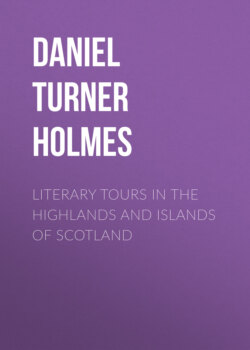Читать книгу Literary Tours in The Highlands and Islands of Scotland - Daniel Turner Holmes - Страница 24
На сайте Литреса книга снята с продажи.
PROFESSOR BLACKIE IN THE HIGHLANDS.
ОглавлениеTable of Contents
One hears a great deal of Professor Blackie in the North and West, and no wonder. He was a laughing, jocular, impressionable man, who hobnobbed with landlords and amiably slapped drivers and policemen on the back, throwing a Gaelic greeting at them as he did so. His faculty for writing poetry is seen in many a guidebook; Oban, Inverness, Pitlochry, and numberless other places, have had their beauties celebrated by this animated writer. He was a good friend to the Highlands—studied Gaelic most arduously, translated some of the finest of the Celtic bards, worked assiduously for the establishment of a Celtic Chair in Edinburgh, spoke many a good word for the crofters—in fact, did everything well except what he was paid to do, viz., teach Greek to his students. Grave D.D.'s could not understand or condone his cantrips. I have been assured that on one occasion, when Professor in the College of Aberdeen, he actually stood on his head before a class of students. Mr. Barrie has given a very amusing and quite unexaggerated account of the Professor's normal demeanour in Edinburgh. Blackie's text books of Greek Dialogues are full of the most waggish remarks.
The landlady of Kinlochewe Hotel gave some lessons in Gaelic to this convulsive old scholar. He would come in with a Celtic Bible below his arm, and, opening the sacred volume, read a chapter or two at a terrific rate of speed, and whistle triumphantly when he had finished. Highland folk did not care to converse with Blackie for three reasons: (1) he spoke too quickly for the leisurely and composed conversation of the Gael; (2) his pronunciation was bad, and people did not like to tell him so or correct him—(no one ever pronounced Gaelic to perfection who did not get the language with his mother's milk); (3) he was fond of using literary words, taken from the older bards, in his ordinary conversation; now, such words are obsolete in every-day talk and quite unfamiliar to crofters and cottars. In the Highlands, Blackie's English was better understood than his Gaelic.
Blackie was undoubtedly a very able scholar—not, indeed, of that minute burrowing kind famous in Germany, but rather of the class that delights in the literature and vivid force of a language. He spoke Latin and Greek, and held views on the teaching of these tongues that seemed more eccentric in his time than they do now. He declared that the linguistic achievement of which he was proudest was his mastery, such as it was, of the language of the Gael.
It affords me pleasure in the retrospect to think of old Blackie at a distribution of prizes to school-children in a town of the West some years before his death. During the chairman's opening remarks the merry old man continued to whistle like a mavis. When the chairman sat down, Blackie embraced him and called him fellow-sinner. Some recitations followed from the children, one of which was Burns's "Address to a Haggis." When the young elocutionist came to the lines—
"Till a' their weel-swall'd kites belyve
Are bent like drums."
Blackie rolled in his chair, held his sides and uproariously expressed his approbation. Then came the distribution of prizes, during which the Grand Old Boy made some pun or quaint remark on each of the children's names, as he presented the books: "Miss Minnie Morrow: never put off till to-morrow what you can do to-day; James Glen: be a real genuine Glen all through life, not a valet or flunkey; William Lindsay: Willie, my lad, imitate your ancestors at Otterburn: 'The Lindsays flew like fire about till a' the fray was done'; Mary Black: black but comely like the daughters of Jerusalem," and so on, in a bird-witted, half-daft way that the audience contemplated with benevolent wonder.
